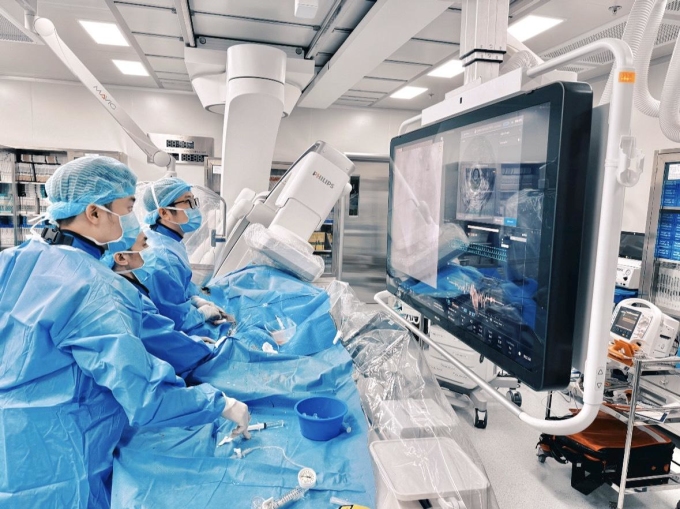Besides the common symptom of angina, patients with myocardial infarction may also experience shortness of breath, dizziness, sweating, and vomiting.
A myocardial infarction (heart attack) is a condition in which blood flow to the heart muscle is suddenly blocked, causing damage to the heart muscle tissue. This usually results from a blockage in one or more coronary arteries. The blockage occurs because a blood clot forms on a ruptured or broken atherosclerotic plaque in the coronary artery.
According to Dr. Huynh Thanh Kieu, Head of Cardiology Department 1, Cardiovascular Center, Tam Anh General Hospital, Ho Chi Minh City, the most common symptoms in patients with myocardial infarction include:
Severe chest pain: Patients experience a feeling of tightness, pressure, or twisting pain in the chest, behind the sternum, or in the left chest. This pain is severe, occurs when sitting or resting, lasts for more than 15 minutes, and radiates to the back, neck, chin, shoulder, or arm. The pain does not subside with the use of oral nitrates or nasal sprays.
Nausea, indigestion, abdominal pain: Pain in the epigastric region (above the navel) accompanied by intermittent vomiting, possibly accompanied by indigestion or heartburn.
Shortness of breath, sweating, fatigue, dizziness, altered consciousness, fainting, or blood pressure dropping below 90/60 mmHg.
In addition to the signs mentioned above, patients with acute myocardial infarction may also experience weakness or paralysis of the limbs; cold sweats; rapid heartbeat; and discomfort when the heart skips or beats faster.
Myocardial infarction can occur unexpectedly, but in some cases, there are warning signs hours, days, or weeks in advance, such as recurrent angina, chest pain during physical activity, and pain that subsides with rest.
Most myocardial infarctions leave behind complications ranging from mild (if treated promptly) to severe (if treatment is delayed). These complications often include arrhythmias, heart failure, cardiac arrest due to arrhythmias, cardiac rupture, blood clots in the heart region, aneurysms, etc.

A coronary artery stenting procedure saved a patient with a myocardial infarction on April 13th. Photo: Tam Anh General Hospital
Depending on the severity of the heart attack, the doctor will prescribe appropriate treatment measures.
Medication use: Some commonly prescribed medications include aspirin, antiplatelet drugs, morphine pain relievers, nitroglycerin, beta-blockers, ACE inhibitors, receptor blockers, and statins.
Coronary artery stenting: A doctor uses a small, long, flexible catheter that is threaded from the radial or femoral artery into the coronary artery. The doctor can locate the blockage and place the stent there. When the stent expands, the blood vessel is widened, allowing blood to flow normally again.
Coronary artery bypass surgery: Doctors take a segment of blood vessel from another part of the body and use it to create a bypass before and after the blockage, allowing blood to flow through the new bypass.
Dr. Kieu advises that heart attacks can be prevented through a heart-healthy diet such as increasing intake of whole grains, green vegetables and fruits, and lean protein; limiting sugar, saturated fats, trans fats, and bad cholesterol. Adopting a healthy lifestyle includes regular exercise, stress reduction, and avoiding tobacco. Maintaining a stable weight and avoiding being overweight or obese is also important.
It is important to stabilize blood pressure and blood sugar levels; control and treat underlying conditions that are risk factors for myocardial infarction, such as diabetes and high cholesterol. Regular cardiovascular checkups are necessary to detect and address any heart abnormalities promptly.
Summer Rain
| Readers can submit questions about cardiovascular disease here for doctors to answer. |
Source link





![[Image] Central Party Office summarizes work in 2025](/_next/image?url=https%3A%2F%2Fvphoto.vietnam.vn%2Fthumb%2F1200x675%2Fvietnam%2Fresource%2FIMAGE%2F2025%2F12%2F18%2F1766065572073_vptw-hoi-nghi-tong-ket-89-1204-jpg.webp&w=3840&q=75)




































































































Comment (0)